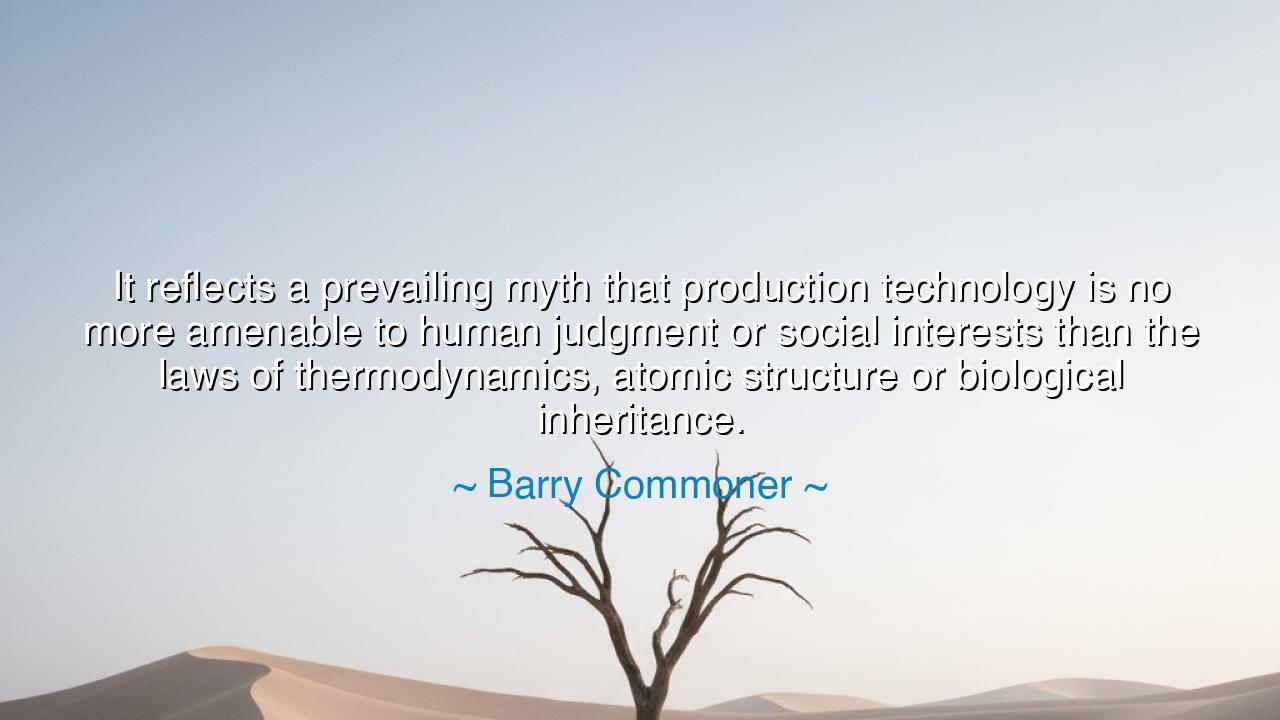
It reflects a prevailing myth that production technology is no
It reflects a prevailing myth that production technology is no more amenable to human judgment or social interests than the laws of thermodynamics, atomic structure or biological inheritance.






Hear the voice of Barry Commoner: “It reflects a prevailing myth that production technology is no more amenable to human judgment or social interests than the laws of thermodynamics, atomic structure, or biological inheritance.” These words pierce the veil of illusion, exposing a false belief that has taken root in the minds of many—that the tools and machines we build are as immutable as the laws of nature. Yet Commoner reminds us that unlike the unchanging truths of physics or biology, technology is a creation of human hands and human will, and thus it is bound to our choices, our values, and our responsibilities.
Since the dawn of civilization, men and women have marveled at the powers they unleash. Fire was once a gift from the gods, a force to be feared and worshipped. But in time, humanity learned that fire is not destiny—it is a servant. So too with the wheel, the forge, the loom: each began as mystery, but became subject to human judgment. Commoner’s words call us to awaken from the new myth, the dangerous belief that production technology is beyond our control, as if it were written in the stars.
Consider the age of the Industrial Revolution. Factories rose, smoke filled the skies, rivers ran black with poison. Many said it was inevitable, that “progress” demanded such sacrifice, that technology itself was a law of nature, unstoppable and indifferent. But history proved otherwise. Workers organized, voices cried out, and governments eventually imposed safeguards—shorter hours, safer conditions, cleaner processes. These victories revealed that production technology is not an iron fate, but clay in the hands of society, able to be shaped toward cruelty or compassion.
And yet, the myth persists. Even today, people say, “We cannot resist automation, pollution, or harmful industries—this is the march of progress.” But progress without conscience is ruin. Look to the tale of nuclear power: born of atomic structure, it carries both the promise of abundant energy and the terror of annihilation. Whether it becomes blessing or curse depends not on physics, but on human judgment. To surrender our will and say “the machine decides” is to abandon the very gift that makes us human: the power of moral choice.
The deeper wisdom of Commoner is this: while thermodynamics and biological inheritance are laws we cannot bend, technology is a tool we may direct. The stars may burn and atoms may split regardless of our will, but how we harness these forces is forever within our domain. To believe otherwise is cowardice masquerading as realism. It is easier to bow before machines and claim helplessness than to take responsibility for guiding them toward justice. But the path of wisdom is not ease; it is courage.
Therefore, let this lesson be carved into your heart: do not confuse invention with destiny. Remember that every factory, every device, every chain of production is a human choice. If it serves greed and destruction, it is because we have allowed it. If it serves life and flourishing, it is because we have willed it so. The myth of inevitability is the enemy of progress; the truth of responsibility is its savior.
Practical wisdom flows from this. When faced with new technology, do not ask only, “Is it possible?” Ask also, “Is it just? Is it good? Does it honor the earth, does it serve the people?” Demand accountability from leaders and creators. As workers, citizens, and dreamers, refuse to accept harm as the cost of progress. In your own life, choose tools and habits that reflect your values, remembering always that the machines we build in turn build the world we live in.
Thus, Commoner’s words stand as a shield for the generations: reject the myth of inevitability. Embrace the truth that production technology bends to the will of human society. For though the laws of thermodynamics are eternal, the path of technology is ours to shape. And if we shape it with wisdom, justice, and reverence for life, then the machines we fear today may become the servants of a brighter tomorrow.






AAdministratorAdministrator
Welcome, honored guests. Please leave a comment, we will respond soon